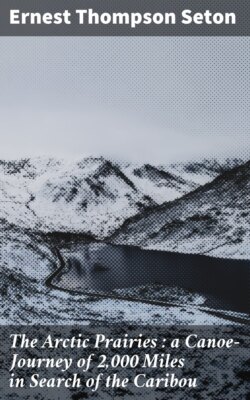Читать книгу The Arctic Prairies : a Canoe-Journey of 2,000 Miles in Search of the Caribou - Ernest Thompson Seton - Страница 13
На сайте Литреса книга снята с продажи.
A CONFERENCE WITH THE CHIEFS
ОглавлениеA few bands of Buffalo are said to exist in the country east of Great Slave River. Among other matters, Major Jarvis had to report on these, find out how many were left, and exactly where they were. When he invited me to join his expedition, with these questions in view, I needed no pressing.
Our first business was to get guides, and now our troubles began.
Through the traders we found four natives who knew the Buffalo range—they were Kiya, Sousi, Kirma, and Peter Squirrel. However, they seemed in no way desirous of guiding any one into that country. They dodged and delayed and secured many postponements, but the Royal Mounted Police and the Hudson's Bay Company are the two mighty powers of the land, so, urged by an officer of each, these worthies sullenly assembled to meet us in Sousi's cabin.
Sousi, by the way, is Chipewyan for Joseph, and this man's name was Joseph Beaulieu. Other northern travellers have warned all that came after them to beware of the tribe of Beaulieu, so we were on guard.
Sullen silence greeted us as we entered; we could feel their covert antagonism. Jarvis is one of those affable, good-tempered individuals that most persons take for "easy." In some ways he may be so, but I soon realised that he was a keen judge of men and their ways, and he whispered to me: "They mean to block us if possible." Sousi understood French and had some English, but the others professed ignorance of everything but Chipewyan. So it was necessary to call in an interpreter. How admirably he served us may be judged from the following sample secured later.
Q. Are the Buffalo near?
A. Wah-hay-was-ki busquow Kai-ah taw nip-ee-wat-chow-es-kee nee-moy-ah. Kee-as-o-win sugee-meesh i-mush-wa mus-tat-e-muck ne-mow-ah pe-muk-te-ok nemoy-ah dane-tay-tay-ah.
Interpreter. He say "no."
Q. How long would it take to get them?
A. Ne-moy-ah mis-chay-to-ok Way-hay-o ay-ow-ok-iman-kah-mus-to-ok. Mis-ta-hay cha-gowos-ki wah-hay-o musk-ee-see-seepi. Mas-kootch e-goot-ah-i-ow mas-kootch ne-moy-ah muk-eboy sak-te-muk mas-kootch gahk-sin-now ne-moy-ah gehk-kee-win-tay dam-foole-Inglis.
Interpreter. He say "don't know."
Q. Can you go with us as guide?
A. Kee-ya-wah-lee nas-bah a-lash-tay wah-lee-lee lan-day. (Answer literally) "Yes, I could go if I could leave the transport."
Interpreter's answer, "Mebby."
After a couple of hours of this bootless sort of thing we had made no headway toward getting a guide, nor could we get definite information about the Buffaloes or the Wolves. Finally the meeting suffered a sort of natural disintegration.
Next day we tried again, but again there were technical difficulties, grown up like mushrooms over night.
Kiya could not go or lend his horses, because it was mostly Squirrel's country, and he was afraid Squirrel would not like it. Squirrel could not go because it would be indelicate of him to butt in after negotiations had been opened with Kiya. Kirma was not well. Sousi could not go because his wife was sick, and it preyed on his mind so that he dare not trust himself away from the settlement; at least, not without much medicine to fortify him against rheumatism, home-sickness, and sadness.
Next day Kiya sent word that he had business of great moment, and could not meet us, but would see that early in the morning Squirrel was notified to come and do whatever we wished. In the morning Squirrel also had disappeared, leaving word that he had quite overlooked a most important engagement to "portage some flour across the rapids," not that he loved the tump line, but he had "promised," and to keep his word was very precious to him.
Jarvis and I talked it over and reviewed the information we had. At Ottawa it was reported that the Wolves were killing the calves, so the Buffalo did not increase. At Winnipeg the Wolves were so bad that they killed yearlings; at Edmonton the cows were not safe.
At Chipewyan the Wolves, reinforced by large bands from the Barren Grounds, were killing the young Buffalo, and later the cows and young bulls. At Smith's Landing the Wolves had even tackled an old bull whose head was found with the large bones. Horses and dogs were now being devoured. Terrible battles were taking place between the dark Wolves of Peace River and the White Wolves of the Barrens for possession of the Buffalo grounds. Of course the Buffalo were disappearing; about a hundred were all that were left.
But no one ever sees any of these terrible Wolves, the few men who know that country have plenty of pemmican, that is neither Moose nor Caribou, and the Major briefly summed up the situation: "The Wolves are indeed playing havoc with the Buffalo, and the ravenous leaders of the pack are called Sousi, Kiya, Kirma, and Squirrel."
Now of all the four, Sousi, being a Beaulieu and a half-breed, had the worst reputation, but of all the four he was the only one that had admitted a possibility of guiding us, and was to be found on the fifth morning. So his views were met, a substitute found to watch his fishing nets, groceries to keep his wife from pining during his absence, a present for himself, the regular rate of wages doubled, his horses hired, his rheumatism, home-sickness, and sadness provided against, a present of tobacco, some more presents, a promise of reward for every Buffalo shown, then another present, and we set out.
